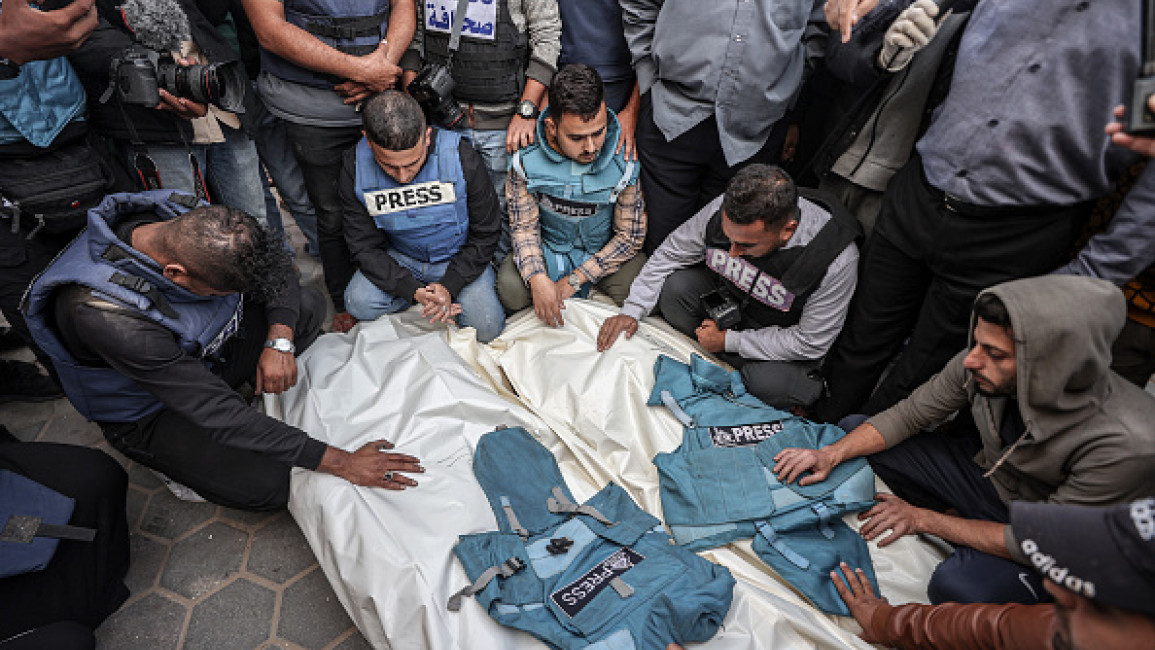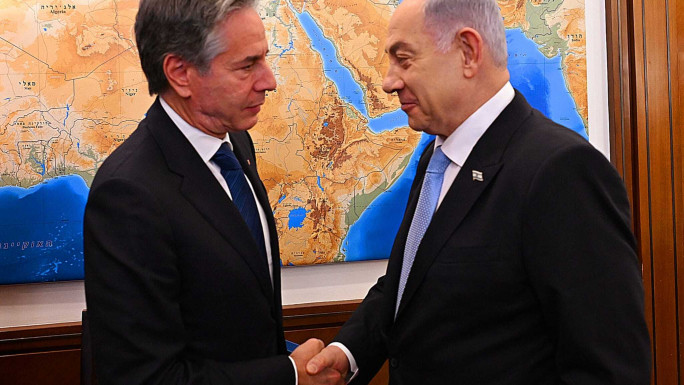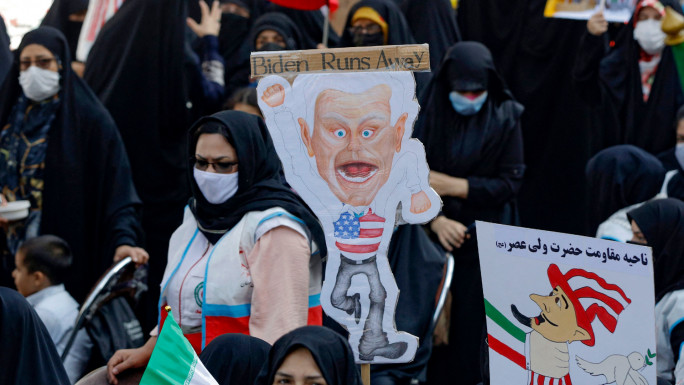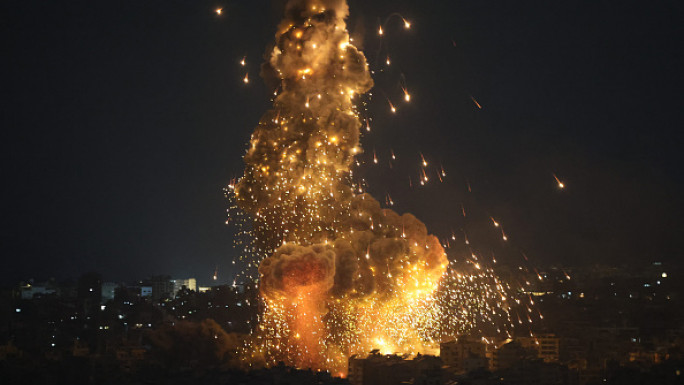
A year of Israel's relentless war on Palestinian journalists

Ramallah - On 22 September, the Israeli military raided Ramallah and closed down the Al Jazeera offices by military order.
At around 3 am, dozens of Israeli military jeeps and armoured personnel carriers entered the city, the de facto headquarters of the Palestinian Authority (PA), firing live ammunition and tear gas as soldiers removed all Al Jazeera staff from their offices, allowing them only to take their personal belongings.
The closure, ordered by the district commander of the Israeli army, included shutting the organisation’s offices for 45 days and the confiscation of all of Al Jazeera’s equipment.
Israeli soldiers even took the microphone and the camera being used by the bureau chief, Walid Omary, and senior correspondent, Givara Budeiri, during their live coverage of the assault.
The closure of the Qatar-based media organisation comes as part of Israel’s intensified campaign to suppress media and reporting from Palestine since Israel launched its brutal ongoing war on Gaza and attacks in the occupied West Bank.
For Palestinian journalists, this intensification is seen as part of Israel’s “war on narratives,” leaving media personnel more vulnerable to Israeli attacks and international audiences more susceptible to manipulation.
Israel's attack on news broadcasting organisations
On 1 April, Israeli Prime Minister Benjamin Netanyahu commented on X that “the terrorist channel Al Jazeera will no longer broadcast from Israel. I intend to act immediately in accordance with the new law to stop the channel’s activity”.
The law he was referring to was pushed in the Israeli Knesset the same month, allowing the Israeli government to close and confiscate media operations in the region if they were considered to pose a threat to Israel.
In May, the law was approved and within hours Al Jazeera was removed from Israel’s biggest TV providers. The news organisation’s offices in Jerusalem were also closed, equipment confiscated, and press credentials for staff withdrawn.
The legislation allowed the Israeli PM and minister of communications to temporarily close down foreign media offices for 45 days, with the capacity for renewal for another 45 days.
Although Netanyahu’s words made it seem that the goal of the law was to shut down Al Jazeera - a media organisation whose coverage has historically been problematic for the Israeli government - the new law was also being enforced more widely and across foreign media agencies.
Just weeks after the closure of Al Jazeera in Jerusalem, the Israeli government seized broadcast equipment and a camera belonging to the Associated Press. The Israeli minister of communications, Shlomo Karhi, accused the US news agency of ignoring Israeli warnings and providing services to Al Jazeera.
Palestinian journalists rise amid global censorship
Mainstream international news agencies such as CNN, the New York Times, and others have long employed censorship policies on coverage of Palestine/Israel. This includes restrictions on using words such as “genocide,” “apartheid,” and “Palestine”. These news agencies also complacently agreed to submit footage to the Israeli military censor in Jerusalem, violating the pillars of journalistic integrity.
While international correspondents have historically yielded to Israel’s reporting demands, often referring to Palestinians killed by Israel in the passive form or neglecting to mention in headlines and reports when the perpetrator is Israel, Palestinian journalists do not acquiesce to such pressures.
“Palestinian journalists are doing such a great job of exposing all the lies away from all the censorship and editorial lines of foreign media that they can’t control, because they’re broadcasting live what is happening here,” Faten Elwan, a veteran journalist who has covered the region for decades, tells The New Arab.
In recent years, Israeli practices of ill-treatment, abuse, and persecution have gained worldwide attention, largely due to the labours and unwavering coverage of Palestinian journalists who risk their lives to report. They are also often the first responders on the ground to areas ignored by the international press.
For these reasons, Israel is intensifying censorship mechanisms while also creating increasingly hostile environments for members of the Palestinian press.
|
|
In 2022, Al Jazeera’s senior correspondent Shireen Abu Akleh was killed by a bullet to the neck while covering Israeli military attacks on Palestinian refugees, amid the newly rising phenomenon of armed resistance in the Jenin refugee camp.
Abu Akleh was one of the first journalists from a mainstream news agency to cover the developing events in Jenin. Since then, the story has garnered worldwide attention and coverage from various international journalists.
In Gaza, with the inability for international correspondents to be on the ground, and the Israeli government rejecting any appeals for the free movement of international press, it is local journalists and social media influencers that have become the primary sources for information.
Such coverage by local Palestinian journalists has exposed Israeli war crimes to the world, with the documentation of these crimes facilitating international state actors to take Israel to international courts for practices of genocide and mobilising civil society to hold Israel accountable.
“The violence against Palestinians is rising, but the true face of Israel is also increasingly being shown, and people are seeing it in the right way,” Elwan said.
Palestinian journalists: A threat to Israel's narrative
During the closure of Al Jazeera’s offices in Ramallah, the Israeli military also ripped down posters of the slain journalist Shireen Abu Akleh, which hung from the balcony.
“I thought, oh damn, she’s really freaking you out, she really put you in a bad spot with the world that even today you want to avenge even a picture,” Elwan said.
While Palestinians are collectively under threat from Israel, it is Palestinian journalists who pose the most risk to Israel’s image in the eyes of the international community.
“[The Israeli army] doesn’t want the image or the voice to get out,” Ranin Abahra, a journalist in Jenin, tells TNA. “There is an impact of Palestinian journalists relaying an honest narrative and story of Palestinians, so the army escalates the attack on journalists,” she said.
Israel’s attacks on journalists span across decades of media manipulation embedded in Israel’s military strategy of annexing Palestinian lands as part of its settler-expansionist project. This is part of Israel’s ‘cognitive war’ which includes awareness as a battlefield.
Israel’s ability to continue its expansion of settlements, procurement of military aid, and support from the US largely depends on how it is perceived in the eyes of not just policymakers, but also civil society.
In the Israeli military handbook, there is a policy of “perception shaping,” which is found as a necessary part of all Israeli operations. That is, Israel must always be perceived in a positive light in the eyes of the international community.
“This is why they’re [targeting the media],” Elwan tells TNA. “It’s not about the increase of Israeli violence, it’s the increase of [our] narrative, it’s a war on the narrative now,” she said.
A camera versus a bullet: The risk of coverage
While the assault on Palestinian media has been a long-standing part of Israel’s occupation, since 7 October Israeli soldiers have become emboldened in their attacks against journalists.
With no international presence in Gaza, the Israeli military has killed at least 116 Palestinian journalists over the past year, according to the Committee to Protect Journalists (CPJ), the deadliest global period for journalists since the group began recording figures in 1992.
In the occupied West Bank, there is a similar trend. “As a journalist in the West Bank, in every dispatch to the field, I put the options that I may return home or I may not,” Ranin Abahra, who reports from Jenin, tells TNA.
“This is because I am covering one of the harshest and most capable fascist armies that are committing crimes of ethnic cleansing in Gaza and won't stop at killing a journalist in the West Bank,” she explained.
Israeli policymakers justify the killing of journalists in Gaza through the claim that they are connected to Hamas. When Israel killed Al Jazeera’s correspondent Ismail Al-Ghoul on 31 July while on assignment, Israel claimed he was a 'Nukhba' (senior) member of the group.
However, an investigation by NBC’s Hala Gorani shows that under Israeli records, Al-Ghoul was listed by Israel as a Hamas operative in 2007, when he was 10 years old.
Notwithstanding the falsity of these claims, when Netanyahu describes media organisations as national threats and Israel alleges that journalists are Hamas fighters, it effectively greenlights violence against all Palestinian media workers.
"Today we witness a high escalation against journalists. Before [the army] would target journalists with teargas and stun grenades, today no. The army targets journalists with live ammunition," Abahra said.
Earlier in September, when Israel waged its military offensive ‘Operation Summer Camps’ in the West Bank, journalists, including Elwan, were targeted with live Israeli gunfire and chased by a military D-9 bulldozer while covering the siege of Jenin and Tulkarem.
At least four journalists were injured directly by live fire, all while wearing their press insignia, and two while driving in their car, also visibly marked with 'PRESS'.
|
|
Breaking the spirit of Palestinian journalists
Palestinian journalists are at risk not only of targeted attacks while reporting in the field but also of arrest and detention by Israel.
On 19 September, Palestinian journalist Mujahed El-Saadi was violently detained at his home after being beaten in front of his wife and three kids, the youngest of whom is only eight months. At the time of writing, El-Saadi was still being held in Megiddo detention camp.
Between 7 October last year and September 2024, the Palestinian Prisoners Society (PPS) documented at least 108 Palestinian journalists arrested by Israel. Of those, 22 were from Gaza and 59 remain under arrest, while 14 are being held without trial or charge, an arbitrary practice known as “administrative detention”.
In some cases, Israel has refused to confirm the whereabouts of those detained in Gaza, or whether they are alive or dead, amounting to a phenomenon of forced disappearance.
“All the detainees in Gaza were detained under the law of ‘illegal combatants’. The amendment of this law was done in December, and it includes that until an order of arrest comes out they’re forcibly disappeared. We don't know anything about them,” S., a lawyer working with Palestinian political detainees, explained to TNA.
S. cannot use their full name due to Israeli restrictions imposed on lawyers.
Journalists are being held by Israel in what the Israeli human rights organisation B’Tselem dubs “a network of torture camps”. Yet according to S., while Palestinian journalists are being exposed to torture methods such as sleep and food deprivation, denial of showers, and physical beatings, they also receive additional mistreatment due to their profession.
“The journalist is a free spirit, whose word is free,” S. explained. “It is very clear in the treatment of them, [Israel] is trying to break them.”
For S., having worked on the cases of dozens of Palestinians, both from the West Bank and Gaza, it has become increasingly clear that journalists pose more of a threat to Israel. “There is a clear Israeli policy in treating educated detainees, this includes doctors, journalists, and so on, in a way that is incredibly humiliating and tortuous, because they have more political awareness of an average citizen,” S. explained.
The continued coverage of Palestinian journalists, their defiance of Israeli policies of censorship, and the refusal to adopt policies accepted by international media make them even more vulnerable to Israeli abuses.
“The way the Israeli courts are treating journalists is in an approach of not only are we going to imprison you but imprison your word and your entire will to even want to be independent and have a free word,” S. told TNA.
Mariam Barghouti is a writer and journalist based in the West Bank. She has been covering the region as a reporter and analyst for ten years, served as the senior Palestine correspondent for Mondoweiss, and is a member of the Marie Colvin Journalist Network.
Follow her on X: @MariamBarghouti


![Palestinian women have been facing sexual and reproductive violence at the hands of Israeli forces for over a year [Getty]](/sites/default/files/styles/image_684x385/public/2174172095.jpeg?h=a5f2f23a&itok=urDtDTO9)





